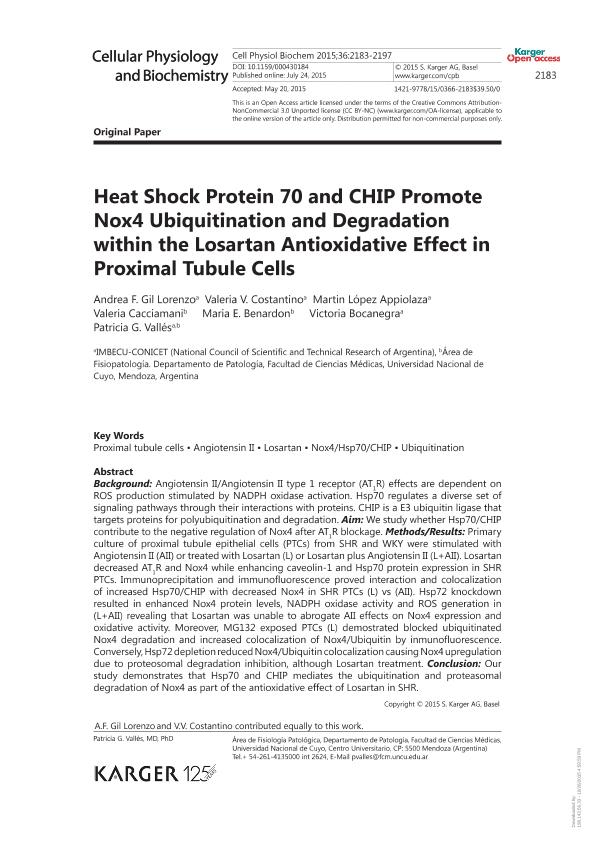Artículo
Heat shock protein 70 and CHIP promote Nox4 ubiquitination and degradation within the losartan antioxidative effect in proximal tubule cells
Costantino, Valeria Victoria ; Gil Lorenzo, Andrea Fernanda
; Gil Lorenzo, Andrea Fernanda ; Lopez Appiolaza, Carlos Martìn
; Lopez Appiolaza, Carlos Martìn ; Cacciamani, Valeria
; Cacciamani, Valeria ; Benardon, María Eugenia; Bocanegra, María Victoria
; Benardon, María Eugenia; Bocanegra, María Victoria ; Garramuño, Patricia
; Garramuño, Patricia
 ; Gil Lorenzo, Andrea Fernanda
; Gil Lorenzo, Andrea Fernanda ; Lopez Appiolaza, Carlos Martìn
; Lopez Appiolaza, Carlos Martìn ; Cacciamani, Valeria
; Cacciamani, Valeria ; Benardon, María Eugenia; Bocanegra, María Victoria
; Benardon, María Eugenia; Bocanegra, María Victoria ; Garramuño, Patricia
; Garramuño, Patricia
Fecha de publicación:
08/2015
Editorial:
Karger
Revista:
Cellular Physiology and Biochemistry
ISSN:
1015-8987
Idioma:
Inglés
Tipo de recurso:
Artículo publicado
Clasificación temática:
Resumen
Background: Angiotensin II/Angiotensin II type 1 receptor (AT1R) effects are dependent on ROS production stimulated by NADPH oxidase activation. Hsp70 regulates a diverse set of signaling pathways through their interactions with proteins. CHIP is a E3 ubiquitin ligase that targets proteins for polyubiquitination and degradation. Aim: We study whether Hsp70/CHIP contribute to the negative regulation of Nox4 after AT1R blockage. Methods/Results: Primary culture of proximal tubule epithelial cells (PTCs) from SHR and WKY were stimulated with Angiotensin II (AII) or treated with Losartan (L) or Losartan plus Angiotensin II (L+AII). Losartan decreased AT1R and Nox4 while enhancing caveolin-1 and Hsp70 protein expression in SHR PTCs. Immunoprecipitation and immunofluorescence proved interaction and colocalization of increased Hsp70/CHIP with decreased Nox4 in SHR PTCs (L) vs (All). Hsp72 knockdown resulted in enhanced Nox4 protein levels, NADPH oxidase activity and ROS generation in (L+AII) revealing that Losartan was unable to abrogate AII effects on Nox4 expression and oxidative activity. Moreover, MG132 exposed PTCs (L) demostrated blocked ubiquitinated Nox4 degradation and increased colocalization of Nox4/Ubiquitin by inmunofluorescence. Conversely, Hsp72 depletion reduced Nox4/Ubiquitin colocalization causing Nox4 upregulation due to proteosomal degradation inhibition, although Losartan treatment. Conclusion: Our study demonstrates that Hsp70 and CHIP mediates the ubiquitination and proteasomal degradation of Nox4 as part ofthe antioxidative effect of Losartan in SHR.
Palabras clave:
ANGIOTENSIN II
,
LOSARTAN
,
NOX4/HSP70/CHIP
,
PROXIMAL TUBULE CELLS
,
UBIQUITINATION
Archivos asociados
Licencia
Identificadores
Colecciones
Articulos(IBAM)
Articulos de INST.DE BIOLOGIA AGRICOLA DE MENDOZA
Articulos de INST.DE BIOLOGIA AGRICOLA DE MENDOZA
Articulos(IMBECU)
Articulos de INST. DE MEDICINA Y BIO. EXP. DE CUYO
Articulos de INST. DE MEDICINA Y BIO. EXP. DE CUYO
Citación
Costantino, Valeria Victoria; Gil Lorenzo, Andrea Fernanda; Lopez Appiolaza, Carlos Martìn; Cacciamani, Valeria; Benardon, María Eugenia; et al.; Heat shock protein 70 and CHIP promote Nox4 ubiquitination and degradation within the losartan antioxidative effect in proximal tubule cells; Karger; Cellular Physiology and Biochemistry; 36; 6; 8-2015; 2183-2197
Compartir
Altmétricas



